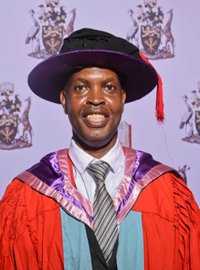
Rufus Karani Munyua is an interpreter/translator trainer and lecturer at the Centre for Translation and Interpretation (CTI), University of Nairobi (Kenya). He holds a Bed (Arts) from Kenyatta University, MA in Interpretation (University of Nairobi) and has been awarded PhD in Kiswahili Translation (University of Nairobi). His research and academic interests include: translation and localization, terminology development, conference interpretation, semantics and pragmatics and research methods. Rufus has a number of publications in peer-reviewed local and international journals. At CTI, he is also a member of the CTI Academic Board and the coordinator of timetables dissertations and programmes.
In addition to teaching, Rufus is a certified freelance interpreter/translator with broad experience interpreting and translating for local and international organizations.
Abstract
Localisation of software products and computer Applications from English into major world languages has been going on for a fairly long time as global companies try to reach local markets for their products. However, it was until early 2000 when companies such as Microsoft started localising their software products in Kiswahili with the aim of availing computer programmes and applications to the over 150 million Kiswahili speakers within the East African region where Kiswahili is a lingua franca. So far, a lot of content in software products and mobile Applications has been localised in Kiswahili by Google. However, although generally the project has been successful to a larger extent, the endeavor has had to deal with some linguistic and cultural challenges. These two challenges informed the overall objective of this research, which was to study linguistic and cultural elements in localised Google products with the aim of assessing how they impact on localisation quality. The findings revealed that the skopos (functions) of source texts was achieved to a larger extent in the target text (TT). However, there were linguistic challenges encountered by localisation translators. These challenges were mainly equivalence related borne from the fact that there are several lexical and structural differences between English as the SL and Kiswahili as the TL which prevent a one-to-one textual relationship within the technical environment. The study recommends that a follow-up research be done to understand user demographics. This is because quality evaluation for localisation and translation particularly for public use highly depends on the users’ perception rather than the perception of linguists.
Research Supervisors
Prof. Iribe Mwangi
Prof. K.W. Wamitila
Prof. Tom Olali
